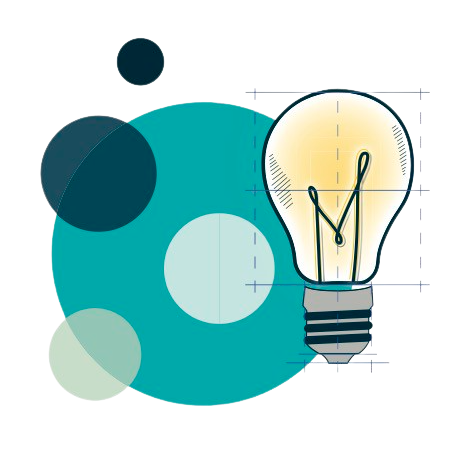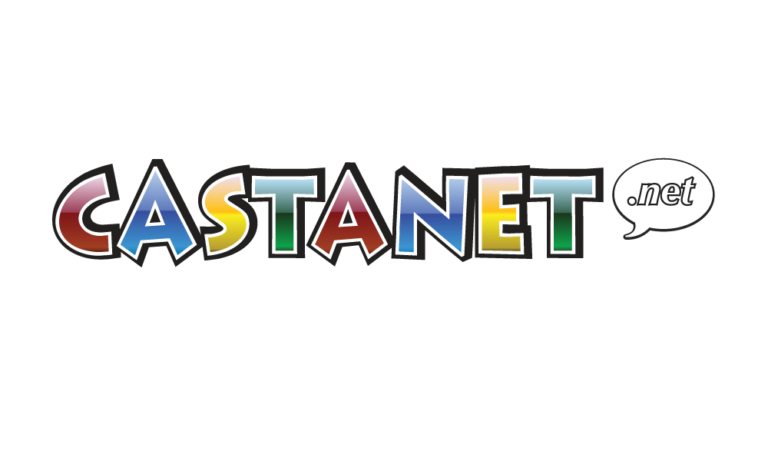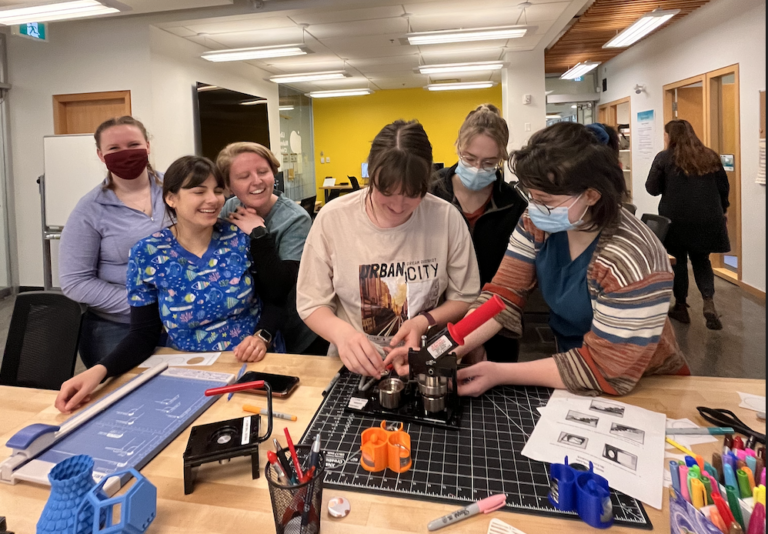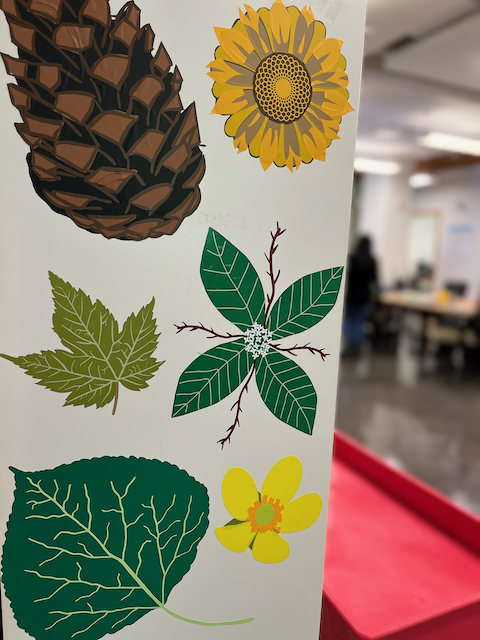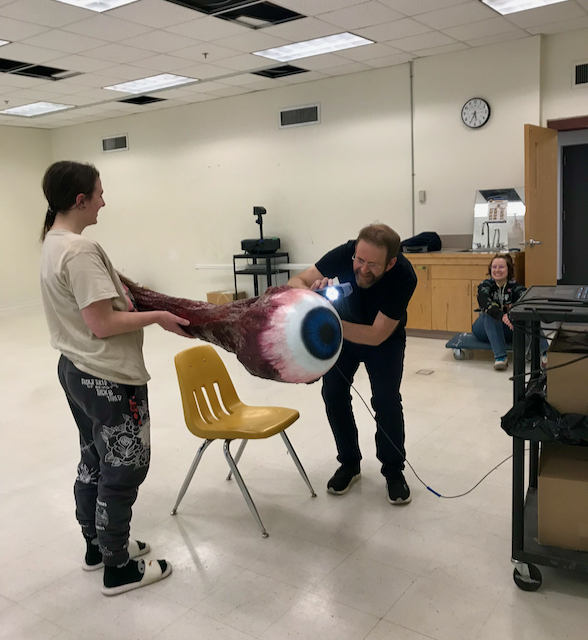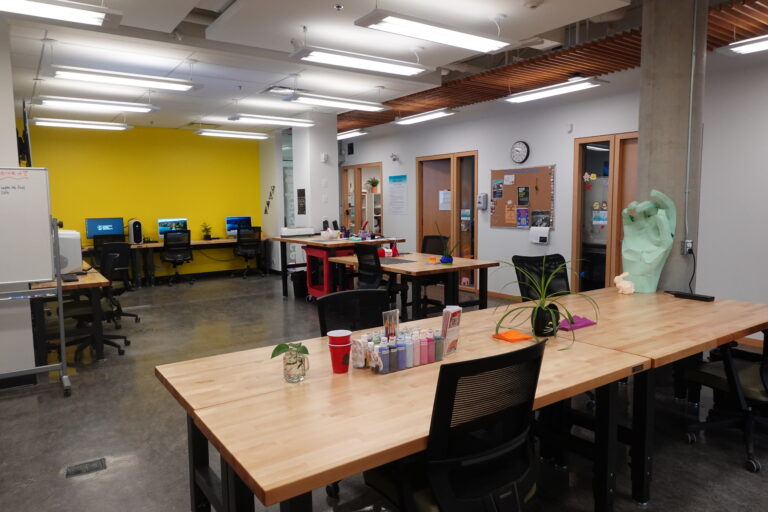Fall 2022 TRU Library Makerspace Report
Fall 2022 was our first full semester since we opened last March and it was a whirlwind of new faces and developments. A lot has happened since our last Makerspace report in May 2022 and we’re excited to share it all with you and talk about what we have planned for the future.
Major Events and Data
Welcoming New Staff
In September we welcomed two new staff members, Valentine Bilton and Sarah Porter, who join Olivia Strodl as the friendly and knowledgable faces you see in the Makerspace. Sarah and Valentine immediately embraced the challenge of working in the makerspace and have both become invaluable members of our team. Learn more about Sarah and Valentine here: Makerspace Welcomes New Staff Members.
Launching the Makerspace Student Ambassador Program
This fall we launched a Student Makerspace Ambassador program and hired 5 students who provide orientations, tours, and support for users as they learn to navigate the Makerspace on their own. We really love how engaged our Student Ambassadors have become, helping with research, creating outreach events, finding ways to improve the user experience, and bringing fresh energy and perspectives to the Makerspace. All 5 of our current Ambassadors returned this term and we hope to continue this program in the future. Learn more about our Student Ambassadors: New School Year, New Ambassador Program!
Increased Curriculum Integration and a new Grant for Faculty in collaboration with CELT

We love seeing what happens when faculty’s disciplinary expertise is combined with student’s creativity! This semester we’ve seen increased curricular integrations, including:
- Fine Arts students using our 3D scanner to create digital objects from physical sculptures and then printing them using our 3D printers.
- First year Engineering students using the space to create Rube Goldberg machines
- Students from across campus using the Makerspace for lots of different class assignments.
- Many class tours to introduce students to the space
“The 3D scanning portion of the assignment was also fun and interesting because I had never used a 3D scanner before and I got to have a tour of the makerspace, which I think is an excellent investment by TRU!””
Fine Arts Student
To further support faculty thinking about curricular integrations we launched the Makerspace Faculty Grants in collaboration with CELT. These grants provide faculty with support and funding to explore using the Makerspace in their classes. Our first faculty grantees were Twyla Exner from the Department of Communications and Visual Arts, and Dr. Bala Nikku from the Faculty of Education and Social Work. Dr. Diane Janes, Coordinator, Learning and Faculty Development (CELT) spearheaded these grants and we’re grateful for her work. The next opportunity to apply for these grants will be announced soon.
Supporting Our Users: 1667 Helpful Interactions
We track how often Makerspace users ask for help so we can understand needs and impact (note: we never collect names or specifics about what was asked). Each interactions could involve one question or twenty, and could take two minutes or an hour. Since September, 2022 we have provided 1667 of these helpful interactions in the Makerspace. This definitely undercounts how many times we’ve helped users because when it is busy we don’t always get around to recording it. That’s a lot of questions!

We also record what technologies users are asking for help with, though it’s important to note that this isn’t the same as how often a technology is used in the Makerspace because something like 3D Printing requires more interactions with staff than something like recording equipment. Other technologies like computer prototyping are used mostly outside the Makerspace so we will never answer many questions about them.

Hosting Events: 19 Events with over 340 Participants
This semester we hosted 19 events with more than 340 participants. These include class tours, visits by departments and staff, student club events, and outreach events. A major push next year will be expanding the number of events in the space hosted by student groups and other departments.
This term we hosted classes from the following areas:
- Social Work
- Engineering
- Fine Arts
- Education
- Management
- Business
We also hosted events in collaboration with:
- TRUSU Physics Club
- TRUSU Anime Club
- Faculty of Education and Social Work
- Women in Engineering
- Faculty of Law
- Indigenous Education
For the second time we collaborated with Engineering Faculty to host young women taking part in the Women in Engineering Robotics Event (https://inside.tru.ca/events/event/women-in-engineering-free-robotics-workshop/). These events bring high school students to TRU for a half day in the Makerspace and a half day building robotics and learning about careers and roles for women in Engineering. This has become a highlight of our term and we look forward to future events!
“VR Free reign in the lab. That the answers were not given and we had to figure it out and given guidance when struggling”
Student feedback to the question “Please tell us all of the aspects you liked about this event “
More Data: Door Counts, Reservations, and Items Check-Outs
At the end of October we added a door counter which tells us the number of people coming into the space. We’re just starting to collect this data, but November is probably representative, with 1573 people coming into the makerspace during that month.

We also lend out equipment like cameras, microphones, and sewing machines, and have some equipment that can be booked online such as our recording studio. We are just starting these two parts of our services, so we are excited to see how they grow in the future.

What’s Next?
Supporting Our Community Running Events in the Makerspace
A great thing about working in a university is being surrounded by intelligent, passionate, and creative people. A space like ours thrives when as many of these people can bring their ideas to life in it as possible. One of our main goals for this year is making our space easier for student groups and other departments to utilize to achieve their goals. We want to see groups run workshops, hackathons, talks, and other events that relate to making, design, crafting, innovation, or hands on learning. To support this we are working to provide:
- Ability to reserve the space for certain types of events
- Access to a “club room” during evenings and weekends for student club events and workshops
- An events calendar and registration system to manage events
- Support for planning
- Help with promotion via our social media channels
Understanding and Sharing Our Impact
Our other main goals is expanding how we understand what is happening in the Makerspace. The easiest impacts to measure are often the shallowest: how many people use the space, how many events do we hold, how many times do we meet with users. The most important and interesting outcomes are hard to measure: what are people learning? How does their time in the space change how they feel about themselves, the university, and their community?
In January we will start a research project investigating how the space is used and is impacting users. This is a collaboration between the myself, Amy Patterson (Assessment Librarian), and the staff who work in the Makerspace (Olivia, Sarah, and Valentine).
We are also going to find more ways to better capture and share all the wonderful and innovative things our users are doing in the space. Often students are excited to share what they are working on, and want to find people to collaborate with, or who will invest in their ideas or future. We want to find ways to help that happen. We are planning a “Make of the Month” program to highlight user work, along with several other community-driven ways to bring people together to collaborate, innovate, and share.
Reflections
Franklin Sayre, Makerspace Librarian
I couldn’t be happier with how the Makerspace is continuously developing – less than a year after launching and we have the staffing and infrastructure in place to operate sustainably, flexibly, and creatively. The credit for this largely goes to our staff, ambassadors, research assistants, users, and support from TRU Library Administration.
I’ve always said that a makerspace should operate as experimentally as we ask users to be in the space, but that’s only possible when you have these pieces in place. When students ask to install software so they can turn drone photos into 3D worlds, or for access to software to make music in our recording studio, we can now say yes, because we are confident we have the basic pieces in place to experiment.
It also feels like we are reaching a critical momentum where things happening in the space are constantly generating new things. Almost daily we see a student bring a friend into the space, or staff members coming because they heard about the space from someone else. We also see this when users share knowledge or ideas with each other (and us) and then we later see it being used in a totally new way by a different user.
My favorite thing is how engaged our users are, especially our students. We regularly hear that students love the Makerspace and that it’s their favorite thing about TRU. That’s satisfying in its own right, but it also shows that there are important connections between engagement, recruitment, and retention happening. We are starting to do research into the role spaces like ours can play in recruitment and retention, especially of underrepresented groups, and we hope to partner with others on campus to develop programs around these themes in the future.
Engagement is also shown when users contribute ideas to the Makerspace. This term alone students have:
- Added software that allows users to load 3D models into our VR systems
- Asked for software to do Photogrammetry, which turns photos into 3D models which is now used by many people
- Asked for software and equipment to record music in the recording studio, which is now regularly used to make music as well as podcasts and videos
Many students have also made it clear that they want to contribute to the space in more structured ways such as volunteering, and we want to explore ways to make that possible through things like service learning and other programs. Post-covid people are looking for community. Our users want more than just access to tools, they want to meet people, share ideas, collaborate. We want that too. We’ve watched many people meet each other in the space, teach each other how to do things, share ideas, and become friends. There is something about working with your hands on a project you are passionate about, while being around others, that makes people feel comfortable connecting with others.
These things: infrastructure, momentum, engagement, and community are what is going to allow us to pursue our next set of objectives.
Olivia Strodl, Makerspace Staff
I am very pleased with how the term has gone. The new staff have brought a different dynamic which I feel has allowed the makerspace to change and progress in a new direction as they have brought a new skillset, views and ideas to the table. This goes for the ambassadors as well who have all been very helpful and knowledgeable about not only different technologies in makerspace but also bringing their different life experiences and views into the space.
I continue to be astounded by the intelligence of the students that use the space. Everyone is friendly and eager to learn. I love seeing the excitement of users faces as they tell me about what they are learning/working on, and how proud they are when it works. Introducing new users to the space for the first time is great. When they find out that this space is available to students and for free they get so excited! I love the diversity of the space; all different genders, ethnicities, ages, programs…..
I want to learn more about the impact the makerspace is having on students and look forward to beginning and taking part in the research project. When I say impact, I mean in regards to mental health and people making friends and finding a place where they can come together.
Sarah Porter, Makerspace Staff
This semester has been an interesting one, I started working at TRU’s Library this August and one of the spaces I am assigned to work in is the TRU Makerspace. What a wonderful experience this has been. I enjoyed interacting with the many wonderful people who make up our TRU Makerspace community, and watching this community grow. I started out not knowing how to use anything in the space, and since then I have learned many new skills: embroidery, vinyl sticker making, paper crafting, button making, 3D modeling, 3D printing, and the list only continues! While very much a beginner at these technologies, I have enjoyed learning through the process of trial and error.
What I think went well this semester was onboarding Student Makerspace Ambassadors to help new users in the space. Each of them has contributed to the atmosphere of the Makerspace and embodies the philosophy of learning by doing. Improvements at the TRU Makerspace I’d look forward to improving the sustainability of the Makerspace through implementing new projects that promote users to think more sustainably as well as gain access to technologies, equipment, and materials to improve sustainability in their own lives.
Questions for thinking about material use I would like to use in the Makerspace: 1. Is this material being used for experimentation for my own learning and skill development? 2. What is the best way to use these materials so any scrap pieces that will be leftover can be salvaged? 3. And if they cannot be salvaged, am I using the materials with as minimal waste as possible?
